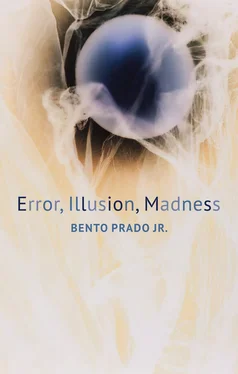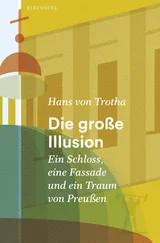ISBN-13: 978-1-5095-3704-4 hardback
ISBN-13: 978-1-5095-3705-1 paperback
A catalogue record for this book is available from the British Library.
Library of Congress Cataloging-in-Publication Data
Names: Prado Júnior, Bento., author. | Oliveira, Marco Alexandre de, translator. | Nunes, Rodrigo, translator. | Moreno, Arley Ramos, other.
Title: Error, illusion, madness / Bento Prado Jr. ; commentaries by Arley Ramos Moreno, Sérgio Cardoso and Paulo Eduardo Arante ; translated by Marco Alexandre de Oliveira and Rodrigo Nunes.
Description: English edition. | Cambridge, UK ; Medford, MA, USA : Polity Press, [2021] | Series: Critical south | “Originally published in Portuguese as Erro, ilusão, loucura. Editora 34 Ltda./Heirs of Bento Prado Jr., 2018.” | Includes bibliographical references and index. | Summary: “A key work on the nature and role of the subject by one of Brazil’s most important philosophers”-- Provided by publisher.
Identifiers: LCCN 2020038421 (print) | LCCN 2020038422 (ebook) | ISBN 9781509537044 (hardback) | ISBN 9781509537051 (paperback) | ISBN 9781509537068 (epub) | ISBN 9781509543571 (adobe pdf)
Subjects: LCSH: Philosophy, Brazilian--20th century. | Prado Júnior, Bento. | Wittgenstein, Ludwig, 1889-1951.
Classification: LCC B1042 .P7313 2021 (print) | LCC B1042 (ebook) | DDC 199/.81--dc23
LC record available at https://lccn.loc.gov/2020038421
LC ebook record available at https://lccn.loc.gov/2020038422
by Fakenham Prepress Solutions, Fakenham, Norfolk NR21 8NL
The publisher has used its best endeavors to ensure that the URLs for external websites referred to in this book are correct and active at the time of going to press. However, the publisher has no responsibility for the websites and can make no guarantee that a site will remain live or that the content is or will remain appropriate.
Every effort has been made to trace all copyright holders, but if any have been overlooked the publisher will be pleased to include any necessary credits in any subsequent reprint or edition.
For further information on Polity, visit our website: politybooks.com
For my grandchildren, Sofia and Bentinho
Chapter 4was translated by Michael B. Wrigley. It is reproduced here by permission of Bloomsbury Publishing. The Foreword was translated by Rodrigo Nunes. The remainder of the text was co-translated by Marco Alexandre de Oliveira and Rodrigo Nunes.
I got lost inside myself
Because I was a maze
And to feel myself these days
Is to find I miss myself.
I am neither myself nor another,
I am something of a medium:
A pillar on the bridge of tedium
That goes from me to the Other.
Mário de Sá-Carneiro, ‘Dispersão’ and ‘7’, excerpts
Foreword No Proper Place of Its Own Vladimir Safatle
A single lexicon is not enough.
João Guimarães Rosa
Is there such a thing as a point of view of the periphery?
Understanding the dynamics proper to traditions of critical thought that have grown on the periphery of core capitalist countries demands a double decolonial twist. For this is not simply a matter of searching there for the themes and questions perceived in European and North American universities as pertaining to the experience of overcoming colonial oppression. It is equally a matter of being attentive to the singular manner in which peripheral countries form traditions of critical thought according to their own demands and through the internalization of programs and problems. One of the most astute ways of perpetuating a certain colonial logic is by believing that some questions are out of bounds for the thought that develops in peripheral countries and belong exclusively to the core. One of the most important tasks for the decolonization of thought is to suspend that interdiction and to assume that anyone can think any question and no tradition is barred to us.
Maybe this is an adequate way of introducing the intellectual experience of Bento Prado Jr. Although he is widely regarded as a major name in the philosophy made in Brazil and one of the country’s foremost essayists, it is only now, ten years after his death, that he is having a book translated into English for the first time. His oeuvre consists of a handful of books that have influenced several generations of Brazilian thinkers. It begins with Presença e campo transcendental: Consciência e negatividade na filosofia de Bergson [ Presence and Transcendental Field: Conscience and Negativity in Bergson’s Philosophy ], the doctoral thesis he presented in the 1960s but published only in the 1980s, and includes Filosofia da psicanálise [ Philosophy of Psychoanalysis ] (1991), Alguns ensaios: Filosofia, literatura e psicanálise [ Some Essays: Philosophy, Literature, Psychoanalysis ] (2000), the Error, Illusion, Madness that readers now have before them, originally published in 2004, as well as the posthumous works A retórica de Rousseau [ Rousseau’s Rhetoric ] (2008) and Ipseitas [ Ipseity ] (2017).
A professor at the University of São Paulo, he was purged by the military dictatorship in the 1960s and had to go into exile. Upon returning to Brazil after the amnesty, 1Bento Prado would dedicate himself to a philosophy founded on the continuous incorporation of contents that seemed external to it, such as literature, anthropology, psychoanalysis, and cognitive science. In each of these areas he was capable of finding the means that philosophical reflection requires in order to come to grips with the problems bequeathed by the field’s history and tradition. But this dispersion of horizons was the manifestation of a more profound limitlessness with which he treated the subject of philosophical tradition itself. Between analytic philosophy and French poststructuralism, between Bergsonian vitalism and a theory of consciousness along Sartrean lines, if one were to examine the moves that Bento Prado made across the board, one would be excused for thinking that he inhabited an impossible space. In his own way, however, Bento Prado was providing a possible answer to the question concerning the specificity of philosophy in a country like Brazil.
From time to time, those working in the field of philosophy in Brazil ask themselves what the country’s “national philosophy” would consist in. Does the philosophy that is practiced in Brazil have a perspective of its own? Is there a positionality that would be all ours? But what are we talking about when we speak of “national philosophies”? For example, it is not a given that “English philosophy” describes an ensemble of intellectual experiences that share some style or signature to some degree. Perhaps there is absolutely nothing common, in the strong sense of the word, between Alfred Whitehead and John Austin apart from the fact that they were both citizens of the same nation-state and subjected themselves to the same political power. The same observation could be made about any other so-called traditions: Habermas and Nietzsche, Foucault and Gabriel Marcel …
We could take this dissociation game to its limits and turn it into a game of reversals. For instance, it is not entirely absurd to say that, from the perspective of how those traditions unfolded, Heidegger is more of a “French” philosopher than a “German” one, seeing as his influence was stronger, richer, and much more decisive on Gallic soil than it was across the border, on Germanic territory. The history of Heideggerianism, if we take into account mostly its processes of reception, may well be tied more intricately to France. In the same way, “French poststructualism” is a typically North American invention, created in order to accommodate intellectual experiments that did not fit the constricted mold set by the analytic philosophy dominant in the United States. If we look at Derrida from the point of view of the consequences of his thought, it would not be absurd to call him a North American philosopher either.
Читать дальше












